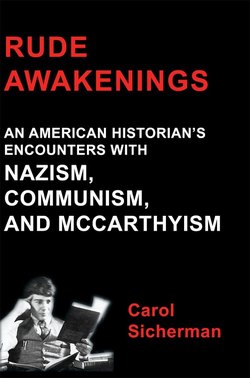Читать книгу Rude Awakenings: An American Historian's Encounter With Nazism, Communism and McCarthyism - Carol Jr. Sicherman - Страница 5
На сайте Литреса книга снята с продажи.
1 Prologue
ОглавлениеIn this book I refer to my father, Harry J. Marks, as “Harry,” a name I never used to his face, as a way of distancing him from the “Daddy” I knew, a way of helping me be an honest chronicler. The book originates in a collection of family papers that I inherited when Harry died in 1988. These papers fall into two categories. One group–family memorabilia and photographs–illustrates the assimilation into mainstream American society of immigrant German Jews of modest background. Another set of documents–the literal and figurative center of this book–relates to Harry’s postgraduate studies in Berlin in 1931-33: some two hundred letters home and the diaries he kept during that period, as well as related letters in the following years; several dozen letters written in 1934-45 by people he had known in Germany; and photographs that he took shortly before leaving Germany in September 1933. My purpose is not that of a memoirist, although this book has some memoiristic features. It is, rather, to show the impact on an American intellectual of three movements: the rise of Nazism in Germany; Communism as a world phenomenon and, more particularly, its presence in the United States; and the reaction to Communism known in the United States as McCarthyism.
Harry’s diaries and letters from Berlin constitute an eyewitness response to the catastrophe unfolding in Germany, a response unmediated by the kind of retrospective analysis one finds in memoirs.1 His friends’ letters speak of the thunderstorm unleashed over their heads and their efforts to find shelter. While often plain and analytical in style, Harry’s letters and, particularly, his diaries rise at times to lyrical beauty and at others are marred by the precious self-consciousness of a lingering adolescence. Although he traveled elsewhere in Germany and made study trips to other European countries, Harry’s diaries and letters focus on Berlin, ground zero of the Nazi “revolution.” In 1933, his writings increased in volume to accommodate the momentous events unrolling before his eyes. His letters (but not his diaries) became more circumspect both because he did not want to alarm his parents and because he feared confiscation and censorship. As one would expect, he omitted significant events; however, when he focused on a particular event, the detail often surpasses what even the most attentive historian might present.
In addition to conveying Harry’s experiences, this book touches on the lives of more than thirty Germans with whom he was friendly during his two years in Berlin. These thirty include a group of people allied through family connections, including ties with Harry’s family in New York; a fellow graduate student named Ernst Engelberg; and several professors who were forced out of Germany shortly after Hitler came to power. Of all of these people, only one had no Jewish connection by either descent or marriage: this was Engelberg, who was in peril because he was a Communist. These friends and relatives shared an atypical fate: all escaped from Germany, and all survived the war.
Harry’s time in Germany, the subject of chapters 3 and 4, is the fulcrum of this book. The preceding chapters examine how his prior personal history shaped him for those two years, while the succeeding chapters depict how the Berlin years affected the rest of his life and the lives of his friends. As a budding historian, he felt fortunate to witness an unfolding cataclysm. “Even the dullest student at the University of Berlin during those years,” wrote another neophyte American historian, “could not but have been aware of the fact, that there were sources of historical knowledge beyond the confines of the Historical Seminar,” the department at the university encompassing modern history.2 As Harry sailed home in September 1933, he envisioned a future as both a historian and a socialist; within months, he was a Communist. His future turned out less rosy than he had expected. He had a number of strikes against him, some not of his own making: the Depression and his Jewishness combined to foil his initial efforts to land an academic job, and for some years he taught high school. After World War II, he managed to achieve much of the academic career of which he dreamed, despite his painful experience of McCarthyism. His professional life at the University of Connecticut (UConn) coexisted with the evolution of a land-grant university from a “cow college” to a major research university. His yearning to belong to a community, manifested through his Communist activities in the 1930s, was fulfilled by his contributions to this academic community.
Harry’s was an academic life well lived, but also one with a shameful secret. It has been unpleasant to investigate his early uncritical enthusiasm for Communism and dismaying to observe his later infection with anti-Communism, an infection that made him eager to inform on those who he believed were Communists. “Some of their descendants might wish this not to be true,” writes Alice Munro about her own ancestors, “but there is not much to be done about the politics of our relatives, living or dead.”3 She speaks for me.
